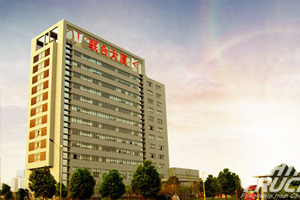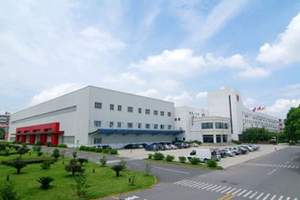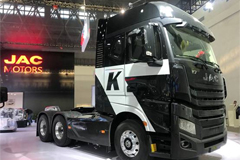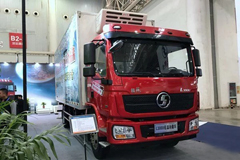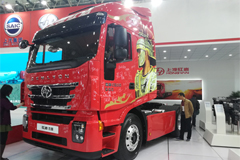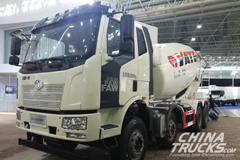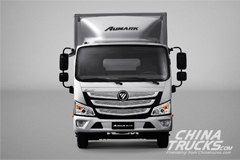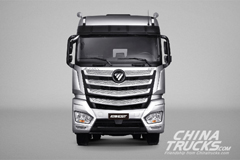Hyundai Ships First Hydrogen Fuel Cell Heavy Trucks to Switzerland
Hyundai Motor Company shipped the first 10 units of the Hyundai XCIENT Fuel Cell, the world’s first mass-produced fuel cell heavy-duty truck, to Switzerland. The company plans to ship a total of 50 XCIENT Fuel Cells to Switzerland this year, with handover to commercial fleet customers starting in September. Hyundai plans to roll out a total of 1,600 XCIENT Fuel Cell trucks by 2025, reflecting the company’s environmental commitment and technological prowess as it works toward reducing carbon emissions through zero-emission solutions.
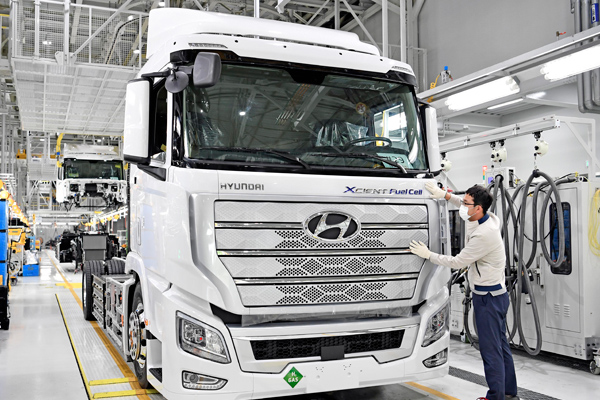
“XCIENT Fuel Cell is a present-day reality, not as a mere future drawing board project. By putting this groundbreaking vehicle on the road now, Hyundai marks a significant milestone in the history of commercial vehicles and the development of hydrogen society,” said In Cheol Lee, Executive Vice President and Head of Commercial Vehicle Division at Hyundai Motor. “Building a comprehensive hydrogen ecosystem, where critical transportation needs are met by vehicles like XCIENT Fuel Cell, will lead to a paradigm shift that removes automobile emissions from the environmental equation.”
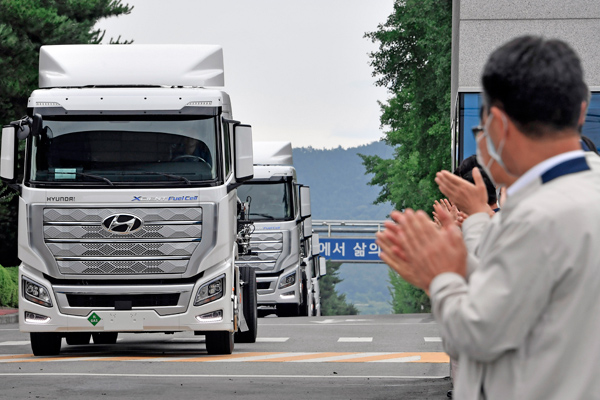
“Having introduced the world’s first mass-produced fuel-cell electric passenger vehicle, the ix35, and the second-generation fuel cell electric vehicle, the NEXO, Hyundai is now leveraging decades of experience, world-leading fuel-cell technology, and mass-production capability to advance hydrogen in the commercial vehicle sector with the XCIENT Fuel Cell,” he added.
XCIENT Fuel Cell
XCIENT is powered by a 190-kW hydrogen fuel cell system with dual 95-kW fuel cell stacks. Seven large hydrogen tanks offer a combined storage capacity of around 32.09 kg of hydrogen. The driving range per charge for XCIENT Fuel Cell is about 400km*, which was developed with an optimal balance between the specific requirements from the potential commercial fleet customers and the charging infrastructure in Switzerland. Refueling time for each truck takes approximately 8~20 minutes.
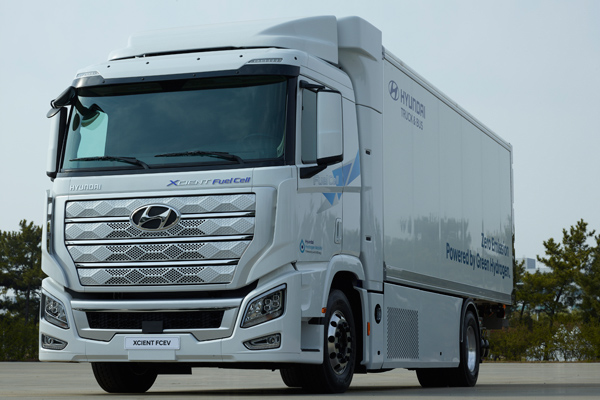
Fuel cell technology is particularly well-suited to commercial shipping and logistics due to long ranges and short refueling times. The dual-mounted fuel cell system provides enough energy to drive the heavy-duty trucks up and down the mountainous terrain in the region.
Hyundai Motor is developing a long-distance tractor unit capable of traveling 1,000 kilometers on a single charge equipped with an enhanced fuel cell system with high durability and power, aimed at global markets including North America and Europe.
Green Hydrogen Ecosystem
In 2019, Hyundai Motor Company formed Hyundai Hydrogen Mobility (HHM), a joint venture with Swiss company H2 Energy, which will lease the trucks to commercial truck operators on a pay-per-use basis, meaning there is no initial investment for the commercial fleet customers.
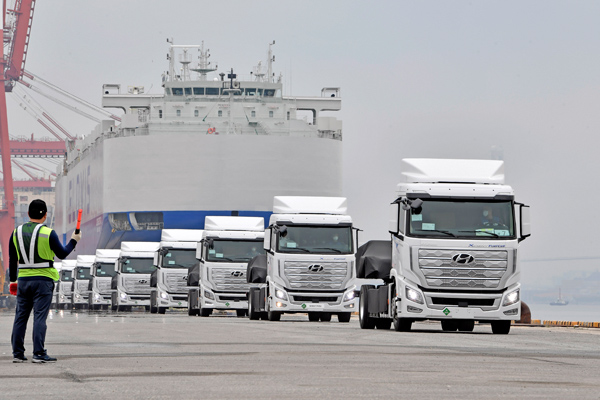
Hyundai chose Switzerland as the starting point for its business venture for various reasons. One of the reasons is the Swiss LSVA road tax on commercial vehicles, which does not apply for zero-emission trucks. That nearly equalizes the hauling costs per kilometer of the fuel cell truck compared to a regular di esel truck.
Hyundai’s business case involves using purely clean hydrogen generated from hydropower. To truly reduce carbon emissions, all of the trucks need to run on only green hydrogen. Switzerland is the country with one of the highest shares of hydropower globally, and can therefore deliver sufficient green energy for the production of hydrogen. Once the project is underway in Switzerland, Hyundai plans to expand it to other European countries as well.
Hyundai Hydrogen Leadership
As Hyundai looks to the future, zero-emissions mobility will play a significant role in the company’s strategy. In addition to the XCIENT Fuel Cell trucks, Hyundai is also the manufacturer of NEXO, its second-generation hydrogen-powered SUV. By 2025, the company aims to sell 670,000 electric vehicles annually, including 110,000 FCEVs.
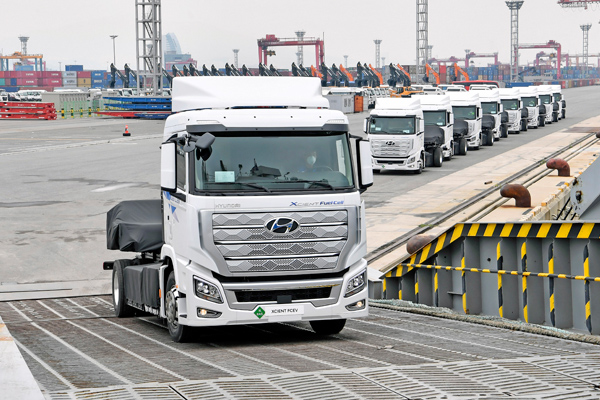
In December 2018, Hyundai Motor Group announced its long-term roadmap, “Fuel Cell Vision 2030”, and reaffirmed its commitment to accelerate the development of a hydrogen society by leveraging its global leadership in fuel cell technologies. As part of this plan, Hyundai Motor Group aims to secure a 700,000-unit-a-year capacity of fuel cell systems for automobiles as well as vessels, rail cars, drones and power generators by 2030.
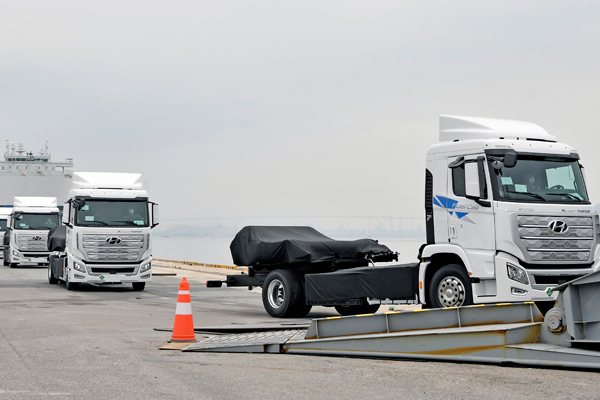
* Driving distance range around 400km in the 4X2 truck with refrigerated upfit configuration while operating 34ton truck + trailer combination
Views:0
Submit Your Requirements, We Are Always At Your Service.
- Jiefang Partners with FCTS to Develop Hydrogen-Powered Car Transport Vehicles
- Farizon Auto Sets Roadmap for Global Expansion
- JMC Assembles Kaiyun Euro 5 Models in Vietnam
- SuperPanther Teams up with DHL for Sustainable Logistics
- SuperPanther Partners with Steyr Automotive to Launch Electric Heavy-Duty Trucks
- JAC Showcases T9 EV Pickup at 2024 EVA Frankfurt Electric Vehicle Expo
- Zoomlion Reports Record Overseas Revenue Growth for H1, 2024
- Madagascar President Rajoelina Visits Foton Motor
- European Premiere for Kia PBV at IAA Hannover 2024
- SAIC Maxus RV Debuts at Düsseldorf Caravan Show in Germany
- Heavy Truck Sales Reach 59,000 Units in July in China
- Tractor Sales in H1, 2024 Reached 162,100 Units, Up 4%
- China's Truck Export Reaches 351,076 Units in H1 2024
- XCMG Dominates 2024 with Record Sales in New Energy Heavy Trucks
- Mid-Year Pickup Market Report: JAC Exports Up 13%, JMC Exceed 36,000 Units
- Truck Exports in May 2024: China Exported Close to 65,000 Trucks
- Exports of Pickups Reached 22,892 Units in May
- Exports Surge by 157%! DFAC Exports 9,628 Vehicles from January to May
- China's Heavy Truck Exports Rising 58% YOY to 276,000 Units in 2023
- China Exported 507,000 Trucks from Jan.-Sept., Up 21% YoY


